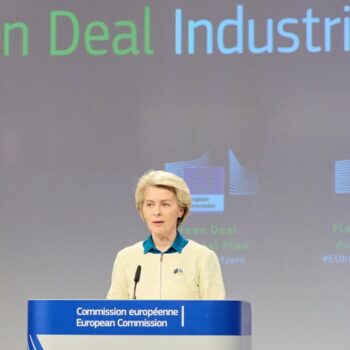The British referendum vote to leave the EU has created political chaos in the UK, and a crisis in the EU. In light of this E3G has pulled together a short series of briefings on how this will impact different areas of our work.
The UK’s vote to leave the European Union has been felt by most continental Europeans as a blow, a rejection. But adopting an (ironically) very British attitude – keep a stiff upper lip, mustn’t grumble – European leaders from Paris to Warsaw, as well as the Brussels “eurobubble”, have gotten down to business to define the new face of Europe.
Brexit negotiations
The European Union still stands. The remaining “EU27” will carry on working towards their established objectives of promoting peace, ensuring the wellbeing of their citizens and sustainable development, while redefining their relationship with the UK. New agreements will need to be struck both at political – mainly through discussions with the European Council in which sit heads of states or governments – and technical level, with the European Commission, and with approval of the European Parliament.
“No notification, no negotiation”. The actual negotiations will only start once “Article 50” of the Treaty of the European Union is triggered. Until then, President of the European Commission Jean-Claude Juncker has forbidden Commission staff from holding discussions with representatives from the British Government. There cannot be “secret negotiations, in darkened rooms behind drawn curtains, between representatives from the United Kingdom, national governments, Commissioners, and Directors-General". It is worth noting that he has himself met with Scottish Prime Minister Nicola Sturgeon on her visit to Brussels, suggesting a more open door policy towards pro-EU Scotland.
“Orderly Brexit”. The European Parliament is calling for a swift withdrawal and asks for the UK presidency of the council, planned for the second half of 2017, to be reassigned to another member state. European Council President Donald Tusk reported that leaders recognise that a “process of orderly exit” is in everyone’s interest and expect the intentions of the UK government to be specified as soon as possible. All 27 heads of states and governments specified in a joint statement that access to the Single Market would require acceptance of all four freedoms – free movement of goods; free movement of services; free movement of persons, including free movement of workers; free movement of capital. The European Council will next meet in September to continue the discussions, without the UK.
A new political balance
The UK, with France and Germany, belonged to the club of the largest and most influential countries in the European Union. The referendum has implications on the balance of political power across Europe, and countries were quick to re-establish their political leadership on the European stage.
Italy, a founding member, would become post Brexit the third economy in the European Union. Italian Prime Minister Matteo Renzi is already taking a centre stage position to make sure the country is well placed to influence ongoing conversations about the future of the European project. Proof is in his presence alongside Merkel and Hollande for the first meeting of the German chancellor with her French counterpart. The young and dynamic Prime Minister Matteo Renzi had challenged Europe to “rediscover its soul, history and values” soon after he took power in 2014; his staff is now describing the referendum as an opportunity to focus ‘a bit more on social issues and a bit less on bureaucratic ones’ and to move away from the current austerity policies. He is however facing difficult internal politics. The country is in the middle of a constitutional reform that needs to be adopted through referendum – probably the biggest gamble of his leadership. Bepe Grillo’s Five Stars Movement, the second most popular political party in the country, hailed the UK referendum as a lesson in democracy and wishes to conduct the same kind of referendum on the country’s belonging to the Eurozone (their stance towards the EU as a whole has however seemed to weaken post UK referendum). It is against that background that Renzi is forging his legacy: showing he is able to reform both Europe and Italy.
Central and Eastern European countries, newer to the Union than Western member states, have been concerned by their lack of influence over European decisions. The relationship between the European Commission and the “Visegrad group” (which comprises Poland, Hungary, Czech Republic and Slovakia) has deteriorated in the past couple of months: the migration question has been the most decisive issue as these countries have blocked any proposal by the Commission to reallocate refugees between Member States. Brexit is both a risk – the UK was an important ally to them – and an opportunity for them to raise their profile in Brussels and in capitals. In a joint statement of the heads of governments, they demonstrated their ambition to take a leadership role in reforming the European Union and called for a ‘Union of trust and action’ focusing on ‘topics that unite us’ and ‘resolv[ing] issues of internal and external security’.
A new Europe?
The results of the referendum are not only testament of the British voters’ anger over the economic crisis, fear over migration, but also a loud call for European reform. This call has been heard by European leaders and institutions, and the future of the European Union will be an important focus point for politicians and policy makers across Europe.
The French and German Foreign Affairs Ministers have already co-signed a policy paper calling for ‘a strong Europe in a world of uncertainties’, explaining that the focus of the EU should be on key areas: security, foreign policy, border control, the digital agenda, energy, transportation and Eurozone governance, while the rest would shift back to national capitals.
It will be more important than ever to ensure that short-term-ism doesn’t distract from fundamental issues such as the fight against climate change and the transition to a sustainable and resilient economy. European Commission staff have started to come out publicly and affirm that they will continue their work to implement the project of building a resilient Energy Union with forward-looking climate policy, as per the planned calendar.
As a strong advocate of a better Europe and of a sustainable and low carbon society, E3G will continue to engage in shaping the future of the UK and the European Union.



